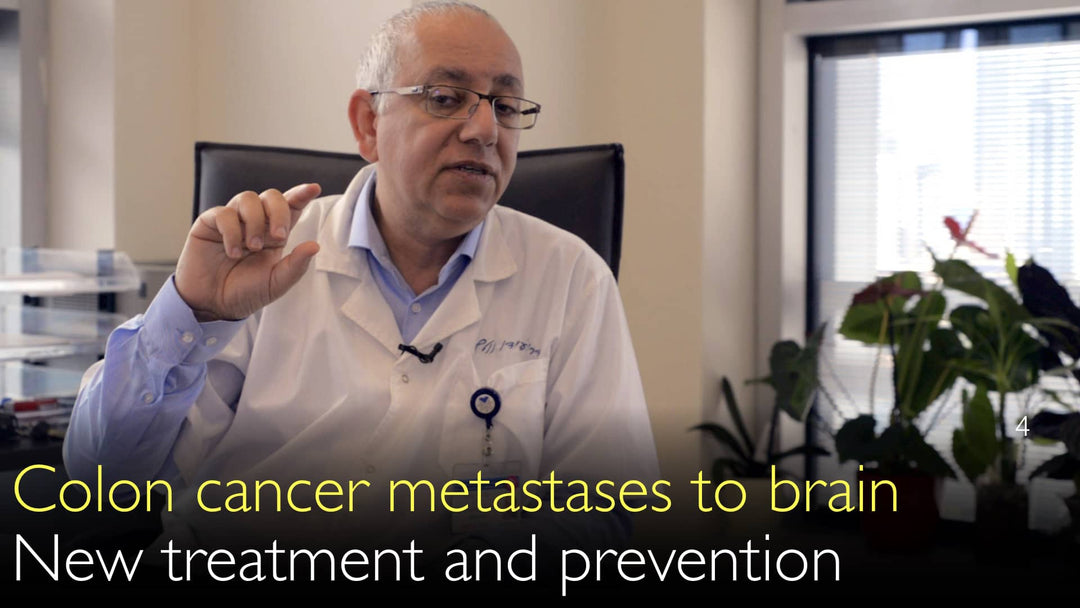Leading expert in precision medicine and oncology, Dr. Ido Wolf, MD, explains new research on cancer metastasis. He details how tumor cells adapt to spread to hostile organs like the brain. Specific mutations allow cancer to thrive in new environments. This discovery enables better prediction of metastatic sites. It also opens new avenues for targeted treatment and prevention strategies.
Understanding and Preventing Brain Metastases in Colorectal Cancer
Jump To Section
- Metastasis in Hostile Environments
- Organ-Specific Mutation Patterns
- Cancer Cell Adaptation Mechanisms
- Predicting Metastatic Spread
- Targeted Treatment and Prevention Strategies
- Full Transcript
Metastasis in Hostile Environments
Cancer metastasis requires cells to travel and survive in foreign, hostile organs. Dr. Ido Wolf, MD, emphasizes that the environment in a metastasis site is completely different from the primary tumor. For example, colon tissue is vastly different from brain tissue. This hostile new environment presents significant challenges for circulating cancer cells.
Dr. Anton Titov, MD, discusses the process with Dr. Ido Wolf, MD. They explore how cancer cells overcome these barriers. The cells must adapt to factors like lower oxygen and glucose levels. This adaptation is a critical step in the formation of a successful metastatic lesion.
Organ-Specific Mutation Patterns
New research reveals that specific metastases have specific mutation patterns. Dr. Ido Wolf, MD, explains that his lab studies various cancers, including colon, pancreatic, and breast. Historically, research focused on the genetics of the primary tumor. The latest discoveries show that metastatic lesions develop their own unique genetic profiles.
These mutation patterns are organ-specific. A liver metastasis from colorectal cancer will have a different genetic makeup than a brain metastasis from the same primary tumor. This finding is crucial because it moves beyond analyzing just the original cancer. It highlights the need to understand the genetics of the metastatic disease itself.
Cancer Cell Adaptation Mechanisms
Cancer cells activate specific molecular switches to survive in a new organ. Dr. Ido Wolf, MD, describes how this adaptation requires a whole network of metabolic activity. The cells must turn on pathways that allow them to proliferate despite hostile conditions. This process is driven by acquiring new mutations that provide a survival advantage.
These mutations are not present in the primary tumor. They are selected for in the new environment. For a colorectal cancer cell to thrive in the brain, it must overcome immense challenges. The molecular mechanisms behind this adaptation are a key focus of current cancer research.
Predicting Metastatic Spread
Understanding mutation profiles could allow doctors to predict where cancer will spread. Dr. Ido Wolf, MD, notes that a specific mutation pattern may give a tumor an advantage to metastasize to a specific organ. By analyzing the primary tumor's genetics, oncologists might forecast the most likely sites of future metastasis, such as the brain or liver.
This predictive ability is a powerful potential application of this research. Dr. Anton Titov, MD, and Dr. Ido Wolf, MD, discuss its profound implications for patient monitoring and screening. Knowing a tumor's propensity for brain metastasis could change how patients are followed after initial treatment.
Targeted Treatment and Prevention Strategies
The ultimate goals are improved treatment and prevention of metastasis. Dr. Ido Wolf, MD, explains that identifying specific vulnerabilities in metastatic cells allows for targeted therapy. For example, inhibiting crucial metabolic pathways could stop a brain metastasis from growing. This approach moves beyond traditional chemotherapy.
Prevention is the best strategy. Dr. Anton Titov, MD, explores this concept with Dr. Ido Wolf, MD. If dangerous molecular pathways are identified in the primary tumor, doctors could target them in advance. This proactive treatment could prevent metastatic spread to the brain altogether, fundamentally improving outcomes for patients with advanced colorectal cancer.
Full Transcript
Metastatic spread of tumor requires cancer cells to travel to hostile "foreign" organs and tissues. Thus, tumor cells acquire new mutations. A leading oncologist and precision medicine expert explains new research on how to predict and prevent metastatic spread of cancer, especially spread of colorectal cancer to the brain.
Dr. Anton Titov, MD: You are studying metastasis, or spread, of cancer cells into other organs. Metastases spread to lungs, liver, but especially to the brain.
You identified particular mechanisms how colorectal cancer cells can spread to the brain. What causes spread of cancer cells to the brain?
What can prevent the metastatic process into the brain from, for example, colorectal cancer?
Dr. Ido Wolf, MD: This is a project that we just recently started. It is a brand new research in our lab. We take various tumors: we study colon cancer, pancreatic cancer, breast cancer. We see what affects the spread of metastasis.
This is an important question because many of the studies that were done today, including genomic studies or RNA sequencing, focused mostly on the primary tumor. This is the tumor tissue that usually cancer researchers have from a surgeon or pathologist.
What we are now discovering is this: most of these cancer discoveries are brand new; they are not even published yet. What we do see is that specific metastasis in specific organs have specific mutation pattern.
Why is that important? Because we know that the environment in the brain or in the liver is completely different from the environment in the primary tumor.
For example, let's talk about breast cancer: the breast tissue is completely different from the liver tissue. Let's talk about colon cancer: the colon itself is completely different from the brain.
That means that the cancer cells need to adapt to a whole new environment. The adaptation requires adapting to lower oxygen levels. It requires adaptation to low glucose levels.
That adaptation requires a whole network of metabolic activity that must be switched on. We are now looking at these specific molecular switches that allow cancer cells to survive and proliferate in a hostile environment.
Because for a cancer cell to go from one tissue to another, the environment around metastases may be quite hostile, but cancer cells still manage to do it. We think that at least some of adaptation is done by specific mutations that drive the metastasis.
These mutations allow cells to proliferate in these hostile environments. That is very important because then you realize that the genetics of the tumor in the primary location can be quite different from metastatic disease.
Metastases to the liver and to the brain frequently happen in colorectal cancers. But environment in the liver is very different from the molecular environment in the brain. Different medications could address different targeted mutations.
First of all, theoretically, we could know the mutation profiles of the primary tumor. Then we may be able to predict to what other tissue sites cancer will go. We know that a specific tumor mutation pattern may give advantage to go to a specific organ site.
One thing is prediction of metastatic cancer location. The other goal is, definitely, treatment of metastatic cancer. We know that you could find specific vulnerabilities of specific metastasis.
Then we can target these specific cancer vulnerabilities. For example, we could inhibit specific cancer metabolic pathways that are crucial for cancer metastasis.
For example, in colorectal cancer, when the cancer metastasized to the brain, that frequently puts patients at the terminal stage of the disease. Addressing the metastatic lesions in the brain is particularly important!
Dr. Anton Titov, MD: Yes, definitely, and maybe even preventing them. How could you possibly prevent the metastatic spread into the brain? For example, by identifying these specific molecular pathways that exist already in the primary tumor. Then oncologists could try to target them in advance.
Dr. Ido Wolf, MD: Prevention is the best treatment, clearly. Yes!







